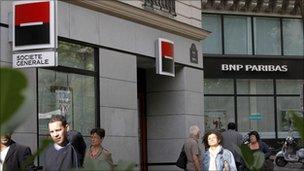France held hostage by its banks
- Published
- comments

French banks are considerably closer to the state than British banks
French bankers are among the brainiest, most ruthless bankers I have met.
And, without naming names, they are also among the rudest individuals I have encountered (I speak with some authority - and painful memories - as a former banking editor of the Financial Times).
But the French way of banking has proved itself formidable. And the French way is to be commercial and rapacious on markets, when it suits, and also only semi-detached from the French state.
Normal career development within the French establishment is to progress from the Tresor, the French finance ministry, to a senior executive post in a French bank, without pausing to acquire commercial experience.
And although French banks are not state-controlled to the extent they once were, they are still considerably closer to the French state than British and American banks - arguably closer even than the Royal Bank of Scotland, which is 83% owned by British taxpayers.
But in today's world of cross-contagion between banks and governments that are financially over-stretched, they represent an argument for what the Independent Commission on Banking is trying to achieve: viz the elimination - as far as possible - of big British banks' dependence on permanent implicit financial support from the UK government.
The point is that France has seen a simultaneous reduction in investors' confidence in the ability of the French state and French banks to pay their respective debts - as manifested in the sharply rising price to insure these debts.
French losses
In this Gallic financial malaise, the originator of the virus is probably the banks - in that they are massively exposed to financially challenged eurozone states, especially Greece, Spain and Italy. And French banks did not raise capital as a protection against losses after the great crash of 2008 to the degree that US and UK banks did (in part because, as I've noted before, they regarded that crash as an Anglo-American mess, in which they were relatively innocent victims).
But with almost no one, except eurozone government heads, saying that Greece can avoid a fairly imminent default, French banks are likely to be weakened by substantial losses. To give some idea of what is at stake, the respective exposures to government and commercial Greek debt of BPCE, Societe Generale, BNP Paribas and Credit Agricole are 3bn euros, 9.2bn euros, 14bn euros and 28bn euros, according to figures they supplied to the European Banking Authority as part of the recent stress tests.
It is relevant to include the commercial exposure, because the Greek economy is contracting very sharply - and it is difficult to see how lenders to the Greek private sector can avoid significant pain.
There is no point in quantifying French banks' exposures to Spain and Italy, other than to say that they are very big. And translating that into the language of the market, Societe Generale's share price has fallen around 70% since February, and Credit Agricole's is 60% lower.
Sir Howard Davies: "In the next couple of days the French government will have to recapitalise their banks."
So here is the problem for President Sarkozy. On the Today Programme this morning, Sir Howard Davies - the former chairman of the UK's Financial Services Authority who is apparently now grooming the next generation of the French elite as a professor at Science Po in Paris - said that the French government would have to announce massive injections of new capital into French banks in the next few days.
The implication was that if the government didn't do this, there would be a risk of creditors' confidence in these banks sapping away to a potentially lethal extent.
But there is profound uncertainty about how much capital is really needed to reinforce French banks, to give them sufficient protection against potential losses - because of the uncertainty about how many eurozone countries will ultimately suffer a return to recession that would compound difficulties in repaying debts.
Strength undermined
The danger is that at the moment that the French government makes explicit an open-ended willingness to underwrite the enormous balance sheets of French banks, the more the perceived strength of the balance sheet of the French state would be undermined. In a worst case, the risk for France is that it becomes Ireland on steroids.
You can see why the recent call for eurozone banks to raise more capital from Christine Lagarde, managing director of the IMF, who till very recently was Mr Sarkozy's trusted finance minister, was not regarded as particularly helpful by her former colleagues.
What it mostly shows is that the rehabilitation of most of the highly-indebted, developed western countries will require firewalls and ring fences not necessarily to be placed around retail banks (though that may be useful) but between banks and taxpayers - because when the debts of banks become the debts of taxpayers, penury looms.
Update 2020: I made what can only be decribed as a schoolboy error, by double counting the sovereign debt exposure of the four French banks.
So the correct exposures, as disclosed to the European Banking Authority, are 1.7bn euros for BPCE, 6.6bn euros for Soc Gen, 8.5bn euros for BNP Paribas and 27bn euros for Credit Agricole.
Many apologies. Perhaps those French bankers were right to be rude to me.